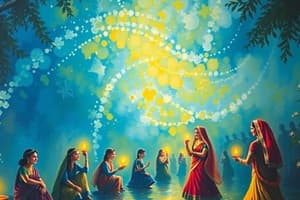Podcast
Questions and Answers
What is the popular belief in eastern Uttar Pradesh and Bihar regarding Lord Krishna and Diwali?
What is the popular belief in eastern Uttar Pradesh and Bihar regarding Lord Krishna and Diwali?
Lord Krishna killed Naraka, the son of King Bhagiratha and freed 14,000 prisoners on this day.
How is Diwali celebrated by different communities apart from Hindus?
How is Diwali celebrated by different communities apart from Hindus?
Diwali is celebrated by Jains, Buddhists, Sikhs, and Newar Buddhists due to its historical significance and traditions involved.
What does Diwali signify for Vaishnavites, Shaivites, and the Ganapatya community?
What does Diwali signify for Vaishnavites, Shaivites, and the Ganapatya community?
For Vaishnavites, it marks the destruction of the corrupt Yadava dynasty by Lord Krishna; for Shaivites, it signifies Shiva's marriage with Parvati; and for the Ganapatya community, it indicates the creation of the universe.
Why is Diwali considered a symbol of unity?
Why is Diwali considered a symbol of unity?
Apart from religious ceremonies, what other activities are part of the Diwali festival?
Apart from religious ceremonies, what other activities are part of the Diwali festival?
Flashcards are hidden until you start studying
Study Notes
History of Diwali
Diwali, also known as Deepavali, is a significant Hindu festival celebrated annually during October or November. Its name translates to "rows of lighted lamps," which refers to the rows of small oil lamps called diyas that people light outside their homes. This festival has its origins in ancient India and over time, it has developed into a major event across the Indian subcontinent, with regional importance varying within different parts of the country.
Origins in Ancient India
The roots of Diwali lie in the Vedic period in the Indian subcontinent around 1500 BCE. The festival was associated with Yama, the god of death, and with Lakshmi, the goddess of prosperity. It was believed that Lakshmi visited every home during this time, so households would cleanse themselves to prepare for her arrival.
Later, when Ramayana stories were established around the beginning of the Common Era, Diwali became linked to Lord Rama's return from exile after killing Ravana, the demon king. People lit candles and fireworks, symbolizing the victory of good over evil and the lifting of spiritual darkness.
Regional Variations and Religious Significance
In north Indian states like Punjab, Haryana, Delhi, Himachal Pradesh, and Chandigarh, Diwali marks the homecoming of Lord Kalki, the final incarnation of God Vishnu, who is said to end all mythical ages. In eastern Uttar Pradesh and Bihar, the popular belief is that Lord Krishna killed Naraka, the son of King Bhagiratha and a sovereign in heaven, and freed 14,000 prisoners on this day. These regional variations have resulted in diverse celebrations across the country.
Diwali is celebrated by Hindus, Jains, Buddhists, Sikhs, and Newar Buddhists. While it is mostly observed as a Hindu holiday, other communities celebrate it as well due to its historical significance and the traditions involved. For instance, for Vaishnavites, Diwali marks the destruction of the corrupt Yadava dynasty by Lord Krishna and initiation of the Kali Yuga; for Shaivites, it signifies Shiva's marriage with Parvati; and among the Ganapatya community, it indicates the creation of the universe.
Modern Celebrations
Today, Diwali is recognized by governments worldwide and is considered one of the most important holidays in India. Along with religious ceremonies, the festival includes various activities such as lighting diyas and decorating homes with garlands, colorful rangoli designs, and electric lights. Firecrackers and fireworks are also used, although these have been criticized for causing air pollution and noise pollution.
Diwali is often seen as a symbol of unity because it is celebrated across religions and cultures, bringing together family members and friends. It is also viewed as a celebration of new beginnings, renewing relationships and offering forgiveness for past misunderstandings.
Studying That Suits You
Use AI to generate personalized quizzes and flashcards to suit your learning preferences.




